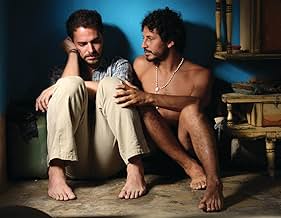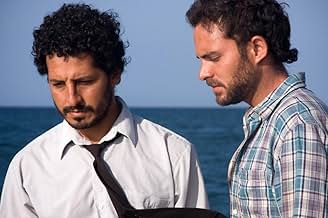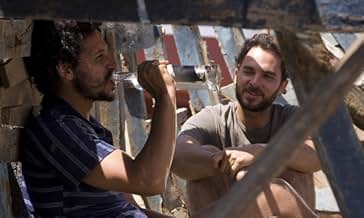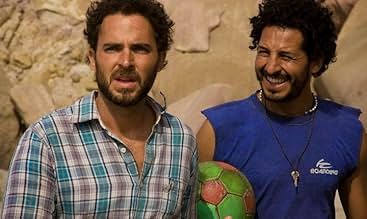AVALIAÇÃO DA IMDb
7,7/10
7,4 mil
SUA AVALIAÇÃO
Uma incomum história de fantasmas ambientada na costa peruana; um pescador casado luta para conciliar sua devoção a seu amante masculino com as rígidas tradições de sua cidade.Uma incomum história de fantasmas ambientada na costa peruana; um pescador casado luta para conciliar sua devoção a seu amante masculino com as rígidas tradições de sua cidade.Uma incomum história de fantasmas ambientada na costa peruana; um pescador casado luta para conciliar sua devoção a seu amante masculino com as rígidas tradições de sua cidade.
- Direção
- Roteirista
- Artistas
- Prêmios
- 13 vitórias e 13 indicações no total
Humberto Cavero
- Padre Juan
- (as Julio Humberto Cavero)
Liliana Alegría
- Carlota
- (as Liliana Alegria Saavedra)
Tomas Fernandez
- Sabino
- (as Tomás Fernández)
Avaliações em destaque
I haven't seen such a touching gay movie since Brokeback Mountain. The movie contains so many issues, yet it could still cover them all and touch the deepest emotions in my heart. The depiction of each character is so profound that you can't help feeling the way they experienced.
Everyone is selfish when it comes to love, and so was Miguel. After he found the way how his wife and Santiago could coexist, he decided not to salvage the body and let Santiago rest in peace. He wanted Santiago to exist just for him, without the risk their relationship to be discovered. But not soon after the rumor of the painting ran wild in the village, his ideal pattern of coexistence vanished! In substitution, here comes the suspicion along with the despite from the so-called innocent village. Miguel's wife is just an ordinary woman who couldn't accept the fact that her husband was screwing other man, but the courage and tolerance she maintained is quite extraordinary. Love is the only way to get through this kind of grief. It's true for Miguel for that the loss of his lover and the courage to admit the rumor. On the other hand, it's also true for Miguel's wife who had to raise her child under this circumstance, not to mention the pressure and gossip she had to put up with.
Masculinity is always a main concept in gay movies. Therefore, Miguel had to struggle with his identification like most conservative gay did. In some way, Santiago is not just his lover, but also the desire of freedom which he had been longed for decades. When Miguel made up his mind to fulfill Santiago's last wish no matter what it costs, the determination and courage he showed really made me weep. No doubt that's the moment he found his own freedom and became a true macho!
Tragedy is when love no longer existed, so I would rather say this movie is about love and forgiveness. For those who has been struggled for their identification, this is a must see movie. Furthermore, for those who be the reason some have to struggle for anything, this is definitely a movie you can' t miss!
Everyone is selfish when it comes to love, and so was Miguel. After he found the way how his wife and Santiago could coexist, he decided not to salvage the body and let Santiago rest in peace. He wanted Santiago to exist just for him, without the risk their relationship to be discovered. But not soon after the rumor of the painting ran wild in the village, his ideal pattern of coexistence vanished! In substitution, here comes the suspicion along with the despite from the so-called innocent village. Miguel's wife is just an ordinary woman who couldn't accept the fact that her husband was screwing other man, but the courage and tolerance she maintained is quite extraordinary. Love is the only way to get through this kind of grief. It's true for Miguel for that the loss of his lover and the courage to admit the rumor. On the other hand, it's also true for Miguel's wife who had to raise her child under this circumstance, not to mention the pressure and gossip she had to put up with.
Masculinity is always a main concept in gay movies. Therefore, Miguel had to struggle with his identification like most conservative gay did. In some way, Santiago is not just his lover, but also the desire of freedom which he had been longed for decades. When Miguel made up his mind to fulfill Santiago's last wish no matter what it costs, the determination and courage he showed really made me weep. No doubt that's the moment he found his own freedom and became a true macho!
Tragedy is when love no longer existed, so I would rather say this movie is about love and forgiveness. For those who has been struggled for their identification, this is a must see movie. Furthermore, for those who be the reason some have to struggle for anything, this is definitely a movie you can' t miss!
This movie gathers impetus as it goes along, so that by the end you are completely caught up in its complex and very moving depiction of the twists and turns of the human heart. The story exists on several levels--love story; political/religious commentary; ghost story. Filmed in a seaside village in Peru, the movie has beautiful cinematography, and the music soundtrack is also evocative of a culture far removed from city life. The three principal actors are superb, especially Cristian Mercado as the tormented husband/lover. The supporting players are also outstanding, each contributing to the overall depiction of the townspeople observing the drama that unfolds. I won't give the plot away except to say that it exists on more than one level of reality. Highly recommended.
This film was the "buzz film" at Frameline, the San Francisco LGBT film festival. It is now in very limited commercial release. I saw it for the second time this week and it's as powerful on the second viewing as the first. It's beautifully filmed in a stunningly picturesque Peruvian fishing village. It features tender and complex performances by the actors in the lead roles, and wonderful authentic performances by native residents of the village location. The story delivers a powerful study in internal conflict, grief, redemption, and the power of love. The director says that the idea for the story came from a screen writing-class assignment to write a scene that happens in a kitchen. The kitchen scene is indeed pivotal to the story, but the moral intricacy of the tale surrounding that scene is testament to a creative genius that you will want to hear more from. You will want to see this film again, and you will want your friends to see it, because the world needs more filmmakers like this.
In early 2010, the first Peruvian film ever nominated for a Foreign Language Film Oscar -- "Milk Of Sorrow" (2009) -- got a U.S. 2-screen release that grossed all of 10K. Clearly UNDERTOW has no Peruvian coattails to ride in on. Despite Sundance kudos and buzz, it's already being ghettoized as a gay film. Yet it clearly is so much more. UNDERTOW doubly violates that genre's political correctness: the lead is both closeted and heroic while the captivating tale constantly eschews white/urbane predictability. We watch two more curve balls being thrown at us as well: next-world fantasy and 3rd world folklore. So this is definitely not "'Brokeback Mountain' meets 'Ghost'" as several critics have written it off in facile reviewer shorthand. But UNDERTOW may well have the power to connect with portions of the mainstream audiences for both of those films -- via word of mouth, curiosity-building press and guerrilla marketing. Our unexpected attraction to a real-life subsistence-poor fishing village and its close-knit, tradition-bound "primitive" citizens are seamlessly woven into the film's cast as well as fabric. Breath-taking cinematography, a script illuminating characters rather than telescoping plot, understated yet powerful performances and a hypnotic world music soundtrack take UNDERTOW far beyond the shorelines of dry-docked movie-making. Many high-concept films have dealt with men forced to choose between family and lovers. Others have pitted unlikely heroes against the mores of society. Nor is a quest to carry out the final wishes of the dearly departed at all innovative. But UNDERTOW combines these themes in a way no writer- director has done before. First-timer Javier Fuentes-León does so with fearless honesty and sublime-on-a-shoestring craft. No surprise then that it's this year's Foreign Language entry from Peru.
There are lots of things that are not told to us in the beginning or middle of this movie. We do not know who are the characters, where they came from or how they started their relationships. The truth is, we do not need to know that. What we need and by the end of the movie what we want to acknowledge is that this is a movie about love (or different types of love). A movie about grieve and it's most different ways of being expressed. A movie about people and about the way they struggle through their lives to hide what they really are and what or who they really role. This is a movie about loss and pain and also about joy and happiness. In the end, this a movie about being human.
The script is remarkable and it runs away from the clichés and the preconceived ideas you might take while you are walking in the projection room. But even more remarkable are the 3 main characters and the actors who portray them. Cristian Mercado delivers a masterclass in acting. By a comfortable mile, one of the best male acting performances of the year. What is most admirable is the way Mercado can express Miguel's painful grievance: the loss of his lover, the acceptance of what he really his and the loss of his beloved wife and son - there are no hysteric portraits of loss. What you get to see is a outstanding performance focused on the facial and physical expression. Also fantastic the the performance by the Mexican actress Tatiana Astengo.
Could this be one of the front runners for the Best Foreing Language movie of the year? No doubt about it.
The script is remarkable and it runs away from the clichés and the preconceived ideas you might take while you are walking in the projection room. But even more remarkable are the 3 main characters and the actors who portray them. Cristian Mercado delivers a masterclass in acting. By a comfortable mile, one of the best male acting performances of the year. What is most admirable is the way Mercado can express Miguel's painful grievance: the loss of his lover, the acceptance of what he really his and the loss of his beloved wife and son - there are no hysteric portraits of loss. What you get to see is a outstanding performance focused on the facial and physical expression. Also fantastic the the performance by the Mexican actress Tatiana Astengo.
Could this be one of the front runners for the Best Foreing Language movie of the year? No doubt about it.
Você sabia?
- CuriosidadesAlthough both main characters are Peruvian, the actors who play them are not. Cristian Mercado (the Fisherman) is Bolivian and Manolo Cardona (the Photographer) is Colombian.
- ConexõesFeatures Direito de Amar (1987)
Principais escolhas
Faça login para avaliar e ver a lista de recomendações personalizadas
- How long is Undertow?Fornecido pela Alexa
Detalhes
- Data de lançamento
- Países de origem
- Centrais de atendimento oficiais
- Idioma
- Também conhecido como
- Undertow
- Locações de filme
- Empresas de produção
- Consulte mais créditos da empresa na IMDbPro
Bilheteria
- Faturamento bruto nos EUA e Canadá
- US$ 108.620
- Fim de semana de estreia nos EUA e Canadá
- US$ 6.749
- 19 de set. de 2010
- Faturamento bruto mundial
- US$ 602.059
Contribua para esta página
Sugerir uma alteração ou adicionar conteúdo ausente























